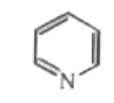The compound that is most difficult protonate is




The correct Answer is:A
To determine which compound is the most difficult to protonate among phenol, water, methanol, and ether, we need to analyze the availability of lone pairs on the oxygen atoms in each compound and how they interact with protons (H⁺).
1. Understanding Protonation:
- Protonation is the addition of a proton (H⁺) to a molecule. The ability of a molecule to be protonated depends on the availability of lone pairs of electrons that can attract and bond with the proton.
2. Identifying the Compounds:
- The compounds in question are:
- Phenol (C₆H₅OH)
- Water (H₂O)
- Methanol (CH₃OH)
- Ether (R-O-R’)
3. Analyzing Phenol:
- Phenol has a hydroxyl (-OH) group, but the lone pair on the oxygen is delocalized into the aromatic ring. This delocalization reduces the availability of the lone pair for protonation.
4. Analyzing Water:
- Water has two lone pairs on the oxygen atom. These lone pairs are readily available for protonation, making water relatively easy to protonate.
5. Analyzing Methanol:
- Methanol also has one lone pair on the oxygen atom, which is available for protonation. It is more available than the lone pair in phenol due to the absence of delocalization.
6. Analyzing Ether:
- Ethers have an oxygen atom with two lone pairs. However, similar to methanol, the lone pairs are available for protonation.
7. Comparing the Compounds:
- Phenol has delocalized lone pairs, making it less available for protonation compared to water, methanol, and ether. Water, methanol, and ether have more available lone pairs for protonation.
8. Conclusion:
- Among the four compounds, phenol is the most difficult to protonate due to the delocalization of its lone pair of electrons.
Final Answer:
The compound that is most difficult to protonate is phenol.
- Protonation is the addition of a proton (H⁺) to a molecule. The ability of a molecule to be protonated depends on the availability of lone pairs of electrons that can attract and bond with the proton.
- The compounds in question are:
- Phenol (C₆H₅OH)
- Water (H₂O)
- Methanol (CH₃OH)
- Ether (R-O-R’)
- Phenol has a hydroxyl (-OH) group, but the lone pair on the oxygen is delocalized into the aromatic ring. This delocalization reduces the availability of the lone pair for protonation.
- Water has two lone pairs on the oxygen atom. These lone pairs are readily available for protonation, making water relatively easy to protonate.
- Methanol also has one lone pair on the oxygen atom, which is available for protonation. It is more available than the lone pair in phenol due to the absence of delocalization.
- Ethers have an oxygen atom with two lone pairs. However, similar to methanol, the lone pairs are available for protonation.
- Phenol has delocalized lone pairs, making it less available for protonation compared to water, methanol, and ether. Water, methanol, and ether have more available lone pairs for protonation.
- Among the four compounds, phenol is the most difficult to protonate due to the delocalization of its lone pair of electrons.
The compound that is most difficult to protonate is phenol.
Similar Questions
Knowledge Check
- Question 1 - Select One
Among the following compounds that can be most readily nitrated is :
AbezeneBbenzaldehydeCTolueneDchlorobenzene - Question 2 - Select One
Among the following compounds that can be most readily sulphonated is :
A B
B C
C D
D
- Question 3 - Select One
Among the following compounds, the most basic compound is :
A B
B C
C D
D
The compound which has most acidic hydrogen
View SolutionWhich of the following metal is the most difficult to extract from its oxide?
View SolutionThe compound that will react most readily with NaOH to from methanol is
View SolutionThe compound that will react most readily with NaOH to from methanol is
View SolutionThe compound that will react with HBr most readily is:
View Solution

